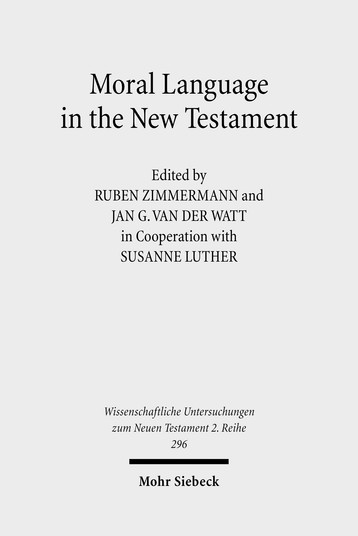Theology
Moral Language in the New Testament
The Interrelatedness of Language and Ethics in Early Christian Writings. Kontexte und Normen neutestamentlicher Ethik / Contexts and Norms of New Testament Ethics. Volume II
Ed. by Ruben Zimmermann, Jan G. van der Watt in Cooperation with Susanne Luther
[Moralische Sprache im Neuen Testament. Der Sinnzusammenhang zwischen Sprache und Ethik in frühchristlichen Schriften.]
104,00 €
including VAT
including VAT
sewn paper
ISBN 978-3-16-150354-2
available
Also Available As:
Published in English.
This volume focuses on the interrelatedness of morality and language. Apart from explicit ethical statements, implicit NT moral language is analysed in three overlapping aspects based on the interpretation of concrete NT texts: an intratextual level (linguistic and analytic philosophical methods: syntactical form, style and logic), an textual and intertextual level (form criticism, discourse analysis) and an extratextual level (speech act analysis; rhetoric; reader-response criticism). With reference to analytical moral philosophy, the contributions address questions such as: Where does the ethical quality of a statement come from? Which linguistic devices are used to express ethics in the NT writings? In which way does the genre of the text influence its ethical meaning? Which pre- and intertexts are part of the ethical statements, in which way does the text refer to them? Which ethical impact did and do texts have on their readers? Which linguistic and rhetorical style is used to meet the addressees? Why do we consider a text powerful or polemic? Can we speak of an implicit ethical subject in the text from a literary perspective?Survey of contents
Richard A. Burridge: Ethics and Genre. The Narrative Setting of Moral Language in the New Testament – Jörg Frey: Disparagement as Argument: The Polemical Use of Moral Language in Second Peter – Sean Freyne : In Search of Identity. Narrativity, Discipleship and Moral Agency – Friedrich Wilhelm Horn: Putting on Christ. On the Relation of Sacramental and Ethical Language in the Pauline Epistles – Lambert D. Jacobs: The »Ethics« of Badmouthing the Other. Vilification as Persuasive Speech Act in First Clement – Kobus Kok: As the Father has sent me, I send you: Towards a missional-incarnational ethos in John 4 – Matthias Konradt: »Whoever humbles himself like this child…«: The Ethical Instruction in Matthew's Community Discourse (Matt 18) and Its Narrative Setting – Hermut Löhr: The Exposition of Moral Rules and Principles in Pauline Letters. Preliminary Observations on Moral Language in Earliest Christianity – Susanne Luther: Protreptic Ethics in the Letter of James. The Potential of Figurative Language in Character Formation – Elijah Mahlangu: Familial Metaphorical Language of Inclusiveness in Destigmatizing the Scourge of AIDS Victims in Africa – François S. Malan: Moral Language in the New Testament. Language and ethics in 2 Corinthians chapter 3 – Karl-Wilhelm Niebuhr: Jesus' »Image of Man« as an Expression of his »Ethics« – Jeremy Punt: »Unethical« language in the Pauline letters? Stereotyping, vilification and identity matters – Gert J. Steyn: Some possible intertextual influences from the Jewish Scriptures on the (moral) language of Hebrews – Etienne de Villiers: Defining Morality in Christian Ethics and the Study of New Testament Ethics – Pieter G. R. de Villiers: Moral Language in Philemon – Jan van der Watt: Ethics through the power of language. Some explorations in the Gospel according to John – Ruben Zimmermann: Ethics and language: some initial explorations
